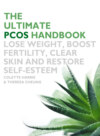Читать книгу: «The Ultimate PCOS Handbook», страница 7
IS IT ALL IN THE MIND?
Does PCOS have something to do with your mental or emotional state? Some researchers believe that it might, in two ways: first, studies22 show it may be caused or triggered by epilepsy or at least one of the medications routinely used (depakote or valproate) to treat epileptic seizures. Second, other studies23 indicate that PCOS may worsen mood and anxiety symptoms.
This is a controversial area of research with potentially huge consequences for the recognition and treatment of PCOS as not just a hormonal disorder but also a mood disorder.
If you’ve got PCOS you probably don’t need a study to tell you that the symptoms can turn your mood black and crank up your anxiety levels from time to time – that’s why Part 3 of this book is packed with advice on stress-reduction and getting yourself in the right frame of mind to take charge of your mood and your symptoms.
BETA CELL FUNCTION
Insulin is produced by the beta cells of the pancreas; researchers are currently investigating whether women with PCOS have a beta-cell function that is more responsive to insulin resistance than women without PCOS. Early studies24 indicate that this may indeed be the case. Further research in this field could well lead to discoveries of new therapies and better diagnoses for women with PCOS and insulin resistance.
METABOLIC SYNDROME (SYNDROME X)
Metabolic Syndrome or Syndrome X is a term used to describe a set of risk factors that increase the risk of heart attack by 4 to 20 times. These factors include insulin resistance, weight gain around the tummy, high levels of blood fats and high blood pressure. It’s thought to be caused by the body’s inability to process a diet high in sugary foods and refined carbohydrates. These refined carbohydrates not only drive the body to insulin resistance but also fail to supply the many nutrients the body needs for hormones to function at optimum levels.
Many women with PCOS have symptoms of Syndrome X – and as it seems possible that men could get PCOS too (see page 13) – could PCOS simply be a female version of symptoms that are triggered by Metabolic Syndrome? Could Syndrome X be the cardiologist’s view of what a gynaecologist would call PCOS? Much more research25 needs to be done.
HOW DO THESE THEORIES HELP ME?
In the end, the most important thing about all the research into PCOS is that it will help scientists, the medical community, natural health practitioners and women who have PCOS to work out the best ways of dealing with it. But the underlying results of most research so far has one thing in common – the best thing any woman with PCOS can do for herself is to take charge of her environment – diet, lifestyle, emotional health – in order to redress the hormonal imbalances within her endocrine system and restore better health. That’s why Parts 2 and 3 of this book are packed with practical information on how to get the help that works best for you and your specific symptoms. And the best thing about these self-help measures is that you can use them with whatever type of medication you decide to take.
Chapter 5 will take a look at what the medical community can offer, but before we launch into medication let’s complete this preliminary overview of PCOS by taking a look at how it affects your hormonal life stages from puberty to the menopause and beyond.
CHAPTER 3 PCOSANDYOUR LIFE STAGES – FROM PUBERTY TO MENOPAUSE
It’s clear that there can be different stages of PCOS throughout your life. Studies1 show, for instance, that younger women tend to have substantial difficulties with their periods, whereas older women2 tend to have other problems such as diabetes and hypertension (high blood pressure).
PCOS symptoms often appear first during puberty, though – as mentioned in Chapter 2 – recent research suggests that PCOS may begin even earlier. According to lead author David Abbott, Ph.D., of the Wisconsin National Primate Center at the University of Wisconsin-Madison,3 PCOS develops in the first and second trimesters of pregnancy when excess androgens are present.
But for now, here’s what we know about how PCOS affects your hormonal life stages, from puberty to menopause and beyond.
PUBERTY AND PCOS
Puberty is the beginning of a physical transformation towards fertility, which usually takes about four years to complete. Body shape, hormone levels and behaviour all begin to change in response to hormonal instructions. Breasts develop, pubic hair grows, bones strengthen and height and weight increase.
In women without PCOS, before the onset of puberty, the pituitary gland prompts the ovaries and adrenal glands to start producing larger amounts of the sex hormones oestrogen and androgen.
Oestrogens, often known as the ‘female’ hormones, control breast development and changes in the vagina and its excretions. Before the first menstrual period (called menarche), levels of oestrogen in the bloodstream begin to fluctuate widely. The womb lining (endometrium) is affected by these hormonal changes until a point is reached when it starts to grow.
Meanwhile androgens, often known as the ‘male’ hormones, control the growth of pubic hair under the arms and in the pubic area, stimulate growth and weight gain and speed up the maturation of the bones and an increase in muscle mass. But androgens mostly come to a teenage girl’s attention when they cause that common and unwanted effect of puberty – acne.
These physical changes may also be accompanied by emotional conflicts, some of which are hormonally triggered. Sudden, unpredictable mood swings in adolescents can be due to the surges in these hormones (think about any PMS or PCOS mood swings you get and it might take you back to your teens).
Бесплатный фрагмент закончился.












